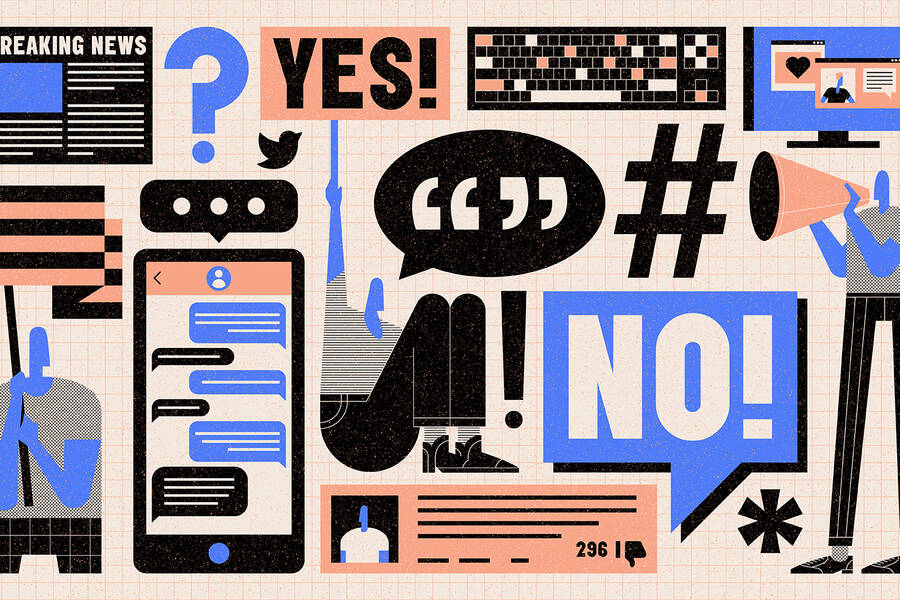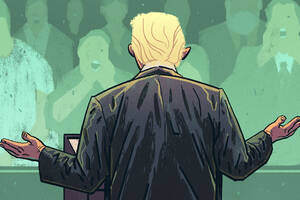Politics & Elections Jul 8, 2022
When Political Discussions Get Heated, Is It Best to Just Stay Out of It?
Keeping your head down when hot-button topics arise could come at a cost to your reputation.

Lisa Röper
When a hot-button issue comes up around the Thanksgiving table or in the cafeteria at work, does your stomach sink? In a deeply divided America, talking politics can inspire dread, prompting many of us to avoid sharing our views altogether. Faced with the prospect of saying the wrong thing or starting an argument, “staying out of it” often feels like the safest move.
But according to new research from Ike Silver, an incoming assistant professor of marketing at the Kellogg School, taking a position of neutrality can come at an unexpected cost. Consider Taylor Swift’s years of silence on political issues. Far from discouraging speculation about the pop star’s views, her avoidance seemed to stoke it. (Swift put an end to the guessing game by endorsing Democratic candidates in 2018.)
Silver and his coauthor Alex Shaw at the University of Chicago were intrigued by the public’s reaction to politics-averse figures like Swift. “People seemed to react so strongly to public figures that don’t take sides,” he says. It got him thinking: while there’s an intuitive appeal to staying out of controversial issues in the hopes of dodging conflict, “Could it backfire?”
Turns out, it can. In a new paper, Silver and Shaw found that declining to take a position on political and social issues inspires mistrust. Audiences often regard those who take a neutral public position not as principled or genuinely neutral, but rather as calculating and deceptive.
“People tend to interpret attempts to ‘stay out of it’ as strategic concealment for some self-interested reason,” Silver explains. “They assume if someone is saying, ‘I’d really rather not get into this,’ what they believe deep down probably contradicts what their audience believes.” Moreover, the fact that they are unwilling to speak their mind comes across as “inauthentic,” he says.
In fact, the researchers found, people often feel more wary of vocal fence-sitters than outright opponents. “In our experiments, neutral actors were seen as insincere and untrustworthy, even compared to political opponents,” Silver explains.
When “I’m Staying Out of It” Is a Losing Move
The researchers conducted 11 experiments to investigate perceptions of “staying out of it.” In one, they recruited 187 college students and asked them to watch a brief video clip of the owner of the Kansas City Chiefs responding to a reporter’s question about players kneeling in protest during the national anthem. The owner responds, “We aren’t doing anything on that today. … There’s really nothing to talk about.”
Participants were randomly assigned to one of two groups: In the first, they were told that the audience for the press conference (the news-station viewers and fans) was mostly conservative. In the second, they were told the audience was mostly liberal.
Participants rated what they thought the team owner really believed about kneeling during the national anthem by indicating whether and how strongly he opposes or supports his players’ actions. Then participants shared their own beliefs about the issue.
Finally, participants indicated how they would feel about the team owner if he had expressed a view that opposed their own personal view instead of taking a neutral stance, by rating how their perceptions of his sincerity, honesty, and trustworthiness would change.
“What we found is that although everyone saw the exact same video, they made opposing inferences about what the team owner believed” depending on what they’d been told about the audience, Silver says. Participants who had been told the team owner was speaking to a mostly liberal audience believed “there’s nothing to talk about” meant that he opposed kneeling during the national anthem, while those who believed his audience was mostly conservative thought the opposite.
In other words, people inferred that strategic motivation—the desire to hide his true beliefs—rather than genuine lack of opinion, guided the owner’s decision not to take a public position.
“Engagement in respectful political discussion, relative to avoiding the conversation at all costs, may be a safer and savvier interpersonal strategy than people realize.”
— Ike Silver
And, strikingly, participants found this seemingly calculated avoidance of disagreement less sincere, honest, and trustworthy than outright opposition. “Many participants, whether they were on the right or the left, said they’d trust him more if he just came out and disagreed with them,” Silver notes.
In other experiments, the researchers found the same pattern. Participants presented with a variety of hypothetical staying-out-of-it scenarios—a state representative declining to discuss removing Confederate statues, an English professor unwilling to share their views on protesting the police, a family member skirting the issue of COVID-19 mask mandates—made similar inferences about these actors’ underlying beliefs. Participants consistently assumed these individuals held views that would be unpopular with their audiences, suggesting that statements of neutrality are typically seen, fairly or not, as strategic ploys.
Better a Foe than a “Who Knows?”
In another experiment, the researchers tested how declining to state a position would impact whom people chose to work with for a cooperative game. They recruited 600 online participants to play a modified version of what is sometimes called the Prisoner’s Dilemma Game, explaining to participants that they would be paired with a partner and, at the same time as their partner, asked to choose between the options “Rely” or “Avoid.”
If both partners chose “Rely,” both would receive 25 cents. If both chose “Avoid,” both would receive nothing. If one partner chose “Rely” and the other “Avoid,” only the partner who chose “Avoid” would receive 30 cents. The idea is that while selfishly undercutting one’s partner is tempting, trust and cooperation yields the best outcome for everyone.
“In our version, we let participants pick who they wanted to play with as a measure of whom they trusted to cooperate with them in the game.”
To help them pick a partner, participants engaged in a belief-sharing exercise. First, participants indicated their personal positions on gun control, choosing between two statements: “I believe ordinary citizens should be allowed to own guns” and “I believe ordinary citizens should NOT be allowed to own guns.” The researchers told participants that their responses had been shared with two potential partners, who had been given the choice to either share their position in return or decline to take a position.
Participants were then prompted to choose between a partner who had declined to take a position and one who disagreed with their view outright. After choosing a partner, participants rated how much they trusted that partner and decided whether or not to cooperate in the game.
Participants showed a strong preference for partners who disagreed with them over partners who declined to take sides, with 61.2 percent opting to play the reliability game with a political opponent and only 38.8 percent choosing a partner who stayed neutral. Statistical analysis revealed that this preference was driven by trust: participants found those willing to voice opposing views more trustworthy than those who stayed out of it.
“We typically think of peoples’ positions on hot-button issues as a signal of their morality or trustworthiness—if you’re my political enemy, I don’t trust you,” Silver says. Nevertheless, in a situation where trust was directly at issue, “participants chose the person who disagreed with them at higher rates than the person who declined to take a side.”
Charging into the Political Fray
Taking a position, whether out in public or at home with a politically divided family, can feel scary. But, Silver points out, this research makes clear that appearing unwilling to take a side is also a risky move.
“Shutting these kinds of discussions down does more to harm interpersonal trust than people expect,” he notes. “Engagement in respectful political discussion, relative to avoiding the conversation at all costs, may be a safer and savvier interpersonal strategy than people realize.”
In fact, Silver points out, “this aligns with a broader set of findings coming out of labs across the country right now, suggesting that people’s perceptions of the amount of dislike between political parties are often overblown. In reality, our political opponents don’t hate us as much as we think.”
The same logic may extend to companies. “Conventional wisdom in marketing and management holds that business leaders should avoid political issues at all costs,” Silver says. “I think our research, in concert with lots of other research, is suggesting that the conventional wisdom is not quite right. Just playing neutral isn’t as safe reputationally as it seems.” If people judge brands and organizations in the same way they judge the public figures depicted in Silver’s studies, it stands to reason that corporate fence-sitting may provoke mistrust and drive customers away in just the same way.
So, at your next family Thanksgiving or work lunch, it may not be the worst idea to say what you really think, provided you do so respectfully. Even your political opponents may trust you more for it.
Susie Allen is a freelance writer in Chicago.
Silver, Ike, and Alex Shaw. 2022. “When and Why ‘Staying Out of It’ Backfires in Moral and Political Disagreements.” Journal of Experimental Psychology: General.



